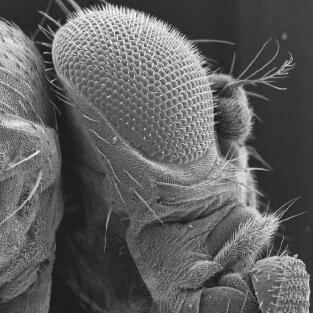
Our research
Nutrients provide raw material to make cells, fuel metabolism, and program signalling and gene expression. The central role of nutrients in cellular function means that organismal traits which are not regulated by nutrition are vanishingly rare. We are interested in how nutrients affect health throughout the lifecourse, especially the ageing process and metabolic disease.
In our research we aim to understand nutrient-regulated processes which are conserved across animals. We are interested in nutrient provision both by diet and by bacteria that live in the gut. We primarily study the fruit fly, Drosphila melanogaster, along with its symbiotic gut bacteria, for four big experimental advantages: (1) Evolutionary conservation. Flies have signalling and metabolic networks which are conserved throughout eukaryotes, and tissues with orthologues in more complex animals (like humans). Working out what these networks do in flies gives us a good idea of what they in all animals. (2) Complete control of the nutritional environment. We can raise flies either germ-free or with controlled communities of microbiota (gnotobiotic animals), and use fully chemically-defined (holidic) media to precisely manipulate levels of any nutrient of interest in the diet. (3) Dual host and microbial genetics. Drosophila offers superb genetic tools and genomic resources, allowing us to manipulate or quantify activity of specific genes of interest in specific tissues at specific times. In addition, the complex functions of the microbiota are fulfilled by a small diversity of species, of which functionally key members are genetically tractable. This allows us to study the bacterial genetic component of host health. (4) Experimental tractability. We can rapidly and efficiently evaluate physiological status on a large scale, and measure key health traits like lifespan, nutrient stores and development time. All these factors mean that we can use the fly as a platform to discover basic principles of nutritional biology, which we expect to eventually translate to human health.
Current projects
Microbiota and host metabolism
Animal guts are colonised by bacteria. Bacteria have enormous capacity to synthesise compounds which their hosts may use at many points in their metabolic networks. Host health may be dependent on the microbiome because animals followed in the evolutionary wake of bacteria, and have therefore never been selected to produce certain key metabolites, which are instead provided by the microbiome. We are combining bacterial and fly genetics to identify bacterial metabolites which regulate conserved host metabolic pathways; and testing whether those metabolites explain impacts of microbiota on health traits such as adiposity and lifespan.
Image: iPath3
Diet and mito-nuclear interactions
Enzymes encoded by the mitochondrial and nuclear genomes must work together to service the cell’s metabolic needs. Genes in both the mitochondrial and nuclear genome are variable, and paternally-inherited alleles can function unexpectedly in conjunction with particular mitochondrial genomes, which are inherited exclusively maternally. This “mito-nuclear” variation appears to be a major determinant of whether a certain diet will be beneficial or detrimental; and emergent patterns of mito-nuclear variation depend on diet. We are interested in which specific nutrients dictate patterns mito-nuclear variation, and whether knowledge of mito-nuclear genotype can help to predict an individual’s optimal diet.
This is a collaboration with Applied Zoology, TU Dresden
Diet, microbes, signalling and epigenetics
Nutrients potently remodel signalling, and many effects of altered nutrient supply are explained by effects on signalling. Some nutrients can also function as both metabolites and signals. These signals can modify the epigenome, and signalling metabolites can also be used as substrates for epigenomic modifications. Separating the metabolic and signalling effects of a certain nutrient may allow us to isolate the desired effects of the nutrient (e.g. longevity), without unwanted side-effects. We are broadly interested in how the balance of metabolic and signalling responses to microbiota and diet mediate healthy versus pathological states.
Image: biorender.


